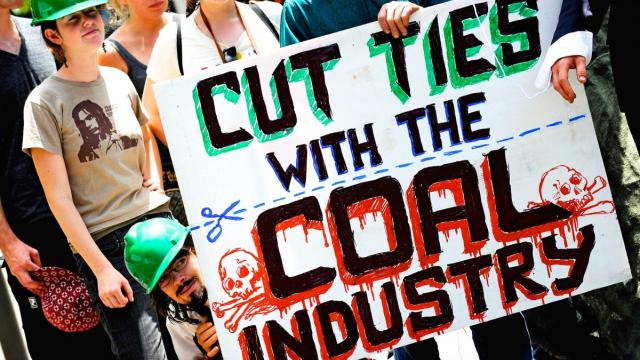
Responding to pressure from environmental groups, the California Academy of Sciences has made public its efforts to cut all financial ties to fossil fuel companies.
Executive director Jonathan Foley made the announcement in a public letter on the Academy’s website just hours after The Natural History Museum and 350.org began a collaborative campaign calling on the country’s top science and natural history museums to divest from fossil fuels.
“Here at the Academy, we’re committed to ensuring that our investment strategies align with our commitment to global sustainability,” Foley said in his letter. “So we’ve started to do exactly that.”
The Academy has already removed all direct investments in fossil fuel companies and started to phase out oil, gas and mineral land leases given to it by donors.
The Natural History Museum and 350.org targeted five of the country’s top science and natural history institutions specifically for its campaign. The others are the American Museum of Natural History, the Field Museum, the North Carolina Museum of Natural Sciences and the Natural History Museum of Utah.
The Academy of Sciences is the only institution that has publicly responded to the campaign thus far.
Cutting Ties
Lindsay Meiman, spokeswoman for 350.org, said Foley’s quick public announcement was his way to clarify that the Academy was already working to “disentangle itself from the fossil fuel industry.”
“This statement was a direct response to our call on museums to cut all ties with the fossil fuel industry,” Meiman said.
In January, the Academy had implemented a gift policy to no longer accept donations from fossil fuel companies.
And with future plans to eliminate all ties with fossil fuel investments from its endowment plans, Meiman called Foley’s announcement “one of the strongest statements we have seen around fossil fuel divestment.”
However, Foley’s announcement is not part of a long-range plan. Rather, he said he would work in the coming months with the Academy’s board of trustees and financial partners to make a specific plan for the future.
Several institutions from across the country – ranging from universities to pension funds – have already cut their connections to fossil fuel investments in the past few years for both environmental and financial reasons.
Financial Impetus
Plunging fossil fuel stocks as a result of sinking oil and coal prices is one financial cause for divestment.
Matt Dempsey, spokesman for the Independent Petroleum Association of America, said it’s important to note that any organization announcing divestment doesn’t necessarily mean it is cutting ties with the fossil fuel industry. He said the organization might have had little or no ties to begin with.
“You have to ask: How much did they have invested in fossil fuels to begin with?” Dempsey said.
Foley has not yet announced the magnitude of the California Academy of Sciences fossil fuel divestment – or made clear whether the divestment decision was at all driven by financial rather than environmental circumstances.
“It’s exactly what the Academy is exploring at the moment,” said Academy spokeswoman Haley Bowling.
3 WAYS TO SHOW YOUR SUPPORT
- Log in to post comments















